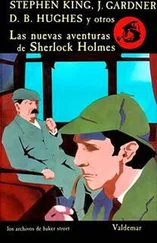I realized I’d stopped listening and came back to Mrs. Spalding’s penetrating voice. “There have been incidents undermining Mrs. Tingley’s excellent administration,” she said. “Heinous acts designed to ruin the Brotherhood and bring disgrace to our Society. First, it was the silkworms, then the avocados, and finally, the disappearance of the queens.”
I was about to ask what an avocado was when Spalding said, “I cannot agree with you about the silkworms, Elizabeth. I’m afraid they committed suicide. But those honeybees,” he added in a firm voice. “I’d stake my life those bees were murdered.”
I dared not look at Holmes. I had persuaded him to see the Spaldings, and now we were trapped at a tea table with two mad people.
To my surprise, the look on Holmes’s face was one of rapt interest. “This Brotherhood,” he asked. “Is it anything at all like the Mormons of Salt Lake?” Holmes had a fascination for secret societies and arcane religions, particularly those that found a congenial home in the former colonies.
Spalding hastened to reassure us that male Theosophists were content with a single wife. Mrs. Spalding added, “The chief goal of the Brotherhood is spiritual education, Mr. Holmes. We maintain a very successful school called the Raja Yoga Academy, and Mrs. Tingley has plans to open a college for the Revival of Lost Mysteries.” She said the last with capital letters, and I sensed an excitement in Holmes. Perhaps this exotic Brotherhood would make up for the regrettable lack of gunfights.
Her husband continued the theme. “The Brotherhood has pioneered modern farming methods in California, Mr. Holmes,” Spalding said. “We have a thriving apiary, and we are experimenting with the use of honeybees to pollinate avocado trees. It is most unfortunate that our experiment was undermined, as I am certain we would have revolutionized the burgeoning industry.”
“Tell me more,” Holmes said, choosing a tea sandwich and leaning back in his chair, clearly prepared to be entertained by our visitors. “I remember as a boy spending hours watching the bees on my grandfather’s smallholding. Bees are fascinating creatures, are they not, Watson?”
I had few opinions on the subject of bees and had never heard Holmes speak of them before. He seldom mentioned his boyhood and I found myself wishing he would reveal a bit more to his biographer.
The Spaldings took turns explaining that they suspected a prominent member of the Theosophical Brotherhood of deliberately undermining the avocado experiment and the excellent apiary, which provided the group with a tidy profit as well as supplying honey and beeswax to the community.
“And I’m convinced she killed the silkworms, too,” Elizabeth Spalding said with a stubborn set to her mouth.
“Silkworms are delicate creatures, my dear,” her husband replied in a mild tone. “Give them one brown mulberry leaf, and they die. Let the temperature drop by one single degree, and they die. We are not the only community that has failed to bring the silk industry to these shores. I hardly think Mrs. Imbler can be blamed for the silkworms.”
“Mrs. Imbler is the lady you suspect?” Holmes asked.
“She is the chief beekeeper,” Spalding said. “It would be the easiest thing in the world for her to destroy the hives upon which our avocados depended.”
“But why would she destroy the hives?” I asked.
Mrs. Spalding leaned forward in her chair and opened her blue eyes wide. “She wants to supplant Mrs. Tingley. I’m certain of it. She has made cutting remarks about the way things are run and hints that she could do better. She has even dared to challenge Mrs. Tingley on matters of Theosophical thought.” She lowered her voice and almost whispered, “I fear for her life, Mr. Holmes. It pains me to say it, but I fear for Mrs. Tingley’s very life.”
This struck me as a wild exaggeration, but Holmes seemed entertained by the prospect of a visit to the Theosophists’ frontier utopia, so we agreed to set off the next morning.
We could see the outline of Point Loma from the pavilion at the Hotel del Coronado. It was a peninsula that jutted out from the mainland and curved southward like the trunk of an elephant. Our peninsula, Coronado, was the bulbous end of a long narrow sand spit nestled under the elephant’s trunk. Between Point Loma and Coronado, a sparkling bay separated the two land masses and opened out to the Pacific.
Our trip from Coronado to Point Loma required a train, a ferry, and a hired hack.
We bumped along a winding, dusty road in an open carriage drawn by a plodding horse, passing few cottages, several species of cacti, and huge swaths of scrubland. On the way, our driver regaled us with stories about Lomaland, as he called the Theosophical colony.
“Children torn from their parents, brought up by strangers,” he’d said, in between copious spittings of tobacco juice. “The parents worship Hindu gods. But that’s not the worst of it, sirs,” he said, lowering his voice. “It’s run by women, run by the Purple Mother, so called because she dresses in purple robes like a pagan priestess. It would be a disgrace-if it wasn’t such a popular tourist attraction.” He said the last with a tobacco-stained grin, and I realized with a start that we were no longer the only conveyance on the road. In the distance, charabancs and public omnibuses, filled with chattering visitors, stood in a line awaiting entrance.
“Some of them are staying at Camp Karnak,” the driver said, and explained that the Society operated a tent city similar to the one next to the Hotel del Coronado. I marveled at the ingenuity of these Americans, who offered lodging at budget rates to travelers who enjoyed the same magnificent views and ocean breezes as the wealthy, the only difference being sleeping under canvas instead of a roof.
Beyond the line of carriages, I could see a sliver of the blue Pacific. The carriages entered the grounds through a magnificent gate decorated in Egyptian motifs. To our right, inside the gate, several large white buildings with colored domes gleamed in the bright California sun. One dome was covered in purple tile, another in aquamarine. Atop the domes were smaller globes of tinted glass. It was a fairyland, reminiscent of the Royal Pavilion at Brighton, where I’d been taken on holiday as a child. I wondered what it was about the seaside that brought out the fanciful in architects.
The cabbie stopped the hack at the gate and asked directions to the Spalding house. The guard pointed to a structure I’d taken for one of the temples. Like the largest building, it had a purple dome topped with a purple glass globe; it also boasted a circular staircase on the outside of the building next to a portico. Spalding was, I decided, the most uxorious man I’d ever met. Few husbands would have indulged a wife to the extent of living in such a monstrosity.
The cabbie pulled in the reins with a flourish next to a walkway lined with stone urns filled with geraniums. I alighted and knocked on the front door, noting the lavender stained glass blocks in the upper section of the windows. A servant answered, and before I could announce myself, she welcomed us and bade the driver bring in our Gladstone bags.
Inside, the sun’s brightness was muted, and the large circular foyer glowed pale amethyst from the purple glass. Exotic bas-relief carvings decorated the columns in the foyer, which was circular and dominated by the rise of the dome.
Mrs. Spalding appeared on the landing and beckoned us upstairs to our rooms. We cleaned the dust of our journey from our persons and clothing and accepted our hostess’s offer of a light lunch with Mrs. Tingley. We were to meet the Purple Mother in the flesh.
Katherine Tingley was a formidable woman in her early fifties, although she stood a mere five feet two in height. She had raven hair, large dark eyes, a determined chin, and the firm voice of a captain of industry. She was not dressed in purple, but wore a perfectly proper Nile-green dress with a double ruffle at the throat. I smiled; my fiancée would have told me the ruffles were a deliberate attempt to soften the air of command, to add a feminine touch to Mrs. Tingley’s masculine directness. I wondered whether Holmes, unblessed by feminine confidences, would draw the same conclusion.
Читать дальше












